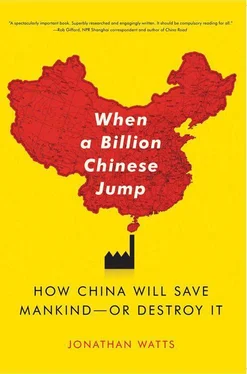During the Cultural Revolution, the stream of people became a flood when Mao encouraged students to go “up to the mountains, down to the countryside.” In a reverse of the urbanization that China is experiencing today, the slogan of that idolatrous age was “The Farther from Father and Mother, the Nearer to Chairman Mao’s Heart.” 15Nationwide, 20 million people went into the countryside. The populations of Xinjiang and Inner Mongolia surged.
The state rallied the pioneers with a call for the idealism and patriotism found in other countries during call-ups for national service during wartime. But those sent to strengthen the border areas ended up using shovels and tractors more than guns and tanks. They converted an area the size of Israel to farmland by irrigating arid plains or requisitioning land from Uighurs. 16In the Taklamakan desert, grain yields reportedly quadrupled in four years, from 1.5 million kilograms in 1966 to 6.5 million kilograms by 1970. The results were proclaimed as a triumph of revolutionary will, but the environmental cost was enormous.
For countless centuries, runoff from the snow-capped mountains gave Xinjiang one of the highest water-to-people ratios in China. This kept oases lush with Euphrates poplars, tamarisk, and calligonum.
But the settlers diverted the rivers for cash crops, particularly in the 1990s when cotton, along with oil, made up the two halves of Xinjiang’s “black-and-white economy.” 17By then Chinese scholars were already warning that Xinjiang’s environmental carrying capacity was being pushed to the limit. There was a precedent of what could go wrong in nearby Uzbekistan, where cotton production had devastated the Aral Sea. But for policymakers in Beijing, a bigger priority was to dilute the ethnic population. The new arrivals needed work. Cotton was the short-term answer, but this meant a huge extra demand on the Tarim and other rivers. 18Countless wadis dried up. The ecological balance was disrupted. Uighur communities were forced to move. Many rare species, such as argali sheep and brown bears, were decimated. 19
To the environmentalist Ma Jun, the uncontrolled irrigation was more than just a waste of resources: “This is clearly an ecological crime. Its victims are the plants, animals, and birds.” 20Large areas of Xinjiang were desiccated. Lop Nor, once the second-largest saltwater lake in China, was effectively soaked up by trillions of cotton buds. In the late 1950s, two-meter-long fish swam in its waters. By 2006, even the smallest species were struggling to survive in what had become a trickle in the desert close to the military’s main nuclear testing ground. With it went the Tarim tiger, the large-headed fish, huge numbers of Bactrian camels, and a greenbelt of poplar forests. 21With the tree barrier gone, the Taklamakan and Kum Tagh deserts joined up, forcing bingtuan units to abandon their barracks and fields. They arrived in the 1960s to “defeat the desert.” They left in the nineties, having surrendered more land to the sands than when they arrived. 22
During our first stop on the road, I chatted to a young woman wearing a headscarf who had just moved to a new village after marrying a local man. I congratulated her and asked how she liked her new home. “It’s good. This place used to have a bad reputation for being poor, but incomes are rising thanks to tourism,” she said. The problem now was not money but water for the family farm. Every ten days she had to apply for an irrigation permit at the local Communist Party office. If approved, her family received a card entitling them to use water for three hours each day, after which they had to divert the irrigation channel toward another permit holder.
At that point we were interrupted. An official wearing army fatigues strolled over indignantly. “Stop that. No journalists here.” Not wishing to make any trouble for the woman in her new home, I left without complaint. I asked driver Wu why the locals were so sensitive. “This is a military zone and you are a foreigner.” I hadn’t noticed on the way in, when all I had seen were newly constructed tourist lodges, but, sure enough, on the nearby hills were clusters of khaki buildings. A short distance down the road was the Nanshan military airport.
As we drove out of the restricted area, Wu told me he too had been forced to retreat from the land. Before he became a taxi driver, he had inherited the farm his parents created in the wilderness. At first he made a decent income growing leeks and peppers. But around 1998, the land deteriorated and the crops failed year after year. The earth had become useless within two generations.
As we talked, a syrupy pop song popular at the time played repeatedly on the car stereo. Its English lyrics conveyed the zeitgeist of mutability:
They say nothing lasts forever.
We’re only here today.
Love is now or never.
Bring me far away.
I asked Wu the name of the singer, assuming he must be a fan because the track had been playing all the way from Urumqi. “I don’t know, I just downloaded it on my computer,” he said, shrugging.
A wall of lush green hills rose up ahead of us. The road climbed and dipped through a narrow gorge flanked by steep granite slopes and dense pine forests. After the two-dimensional flat pastels of the plain, there was a pleasing variety of shape and color above, below, and on either side. I had time to enjoy it. Our car was twice held up by flocks of goats being shepherded along the narrow road by Kazakh herders on horseback. Such scenes would soon be a thing of the past. Earthmovers and mechanical diggers were laying the foundations for a new highway that would speed tourists through the valley without interruption.
After thirty minutes the pastoral scene on either side of the ravine gave way to an industrial horror story. The valley widened, the light dimmed, and the air thickened. This was no mountain mist or low cloud. It was a putrid haze. The source was an anti-Shangri-La, a dirty secret hidden in the hills: the Houxia power plant and concrete factory, which appeared to be competing with one another to belch the most sulfurous smoke into the sky. Their chimney stacks were too short to lift the gas above the roof of the valley, so the smog gathered denseness, shrouding the dormitories of the workers and the black heaps of coal waiting to be fed into the furnaces.
This industrial estate was another legacy of Mao’s push into the borders. Factories like this were part of preparations for war against the Soviet Union in the 1960s and 1970s, when the chairman declared a “Third Front” in the country’s most remote inland regions. His plan was to scatter China’s industrial base so that it would be safe from bombing. Soldiers and students set about building roads and factories in rural idylls. It was a major cause of disruption of local ecologies. 23
We drove onward, upward, and out of the smog. Almost immediately the scenery returned to a bucolic state. The road climbed beside steep gorges, through thick pine forests, and up onto alpine meadows. A familiar muzziness told me the altitude was around 3,000 meters. On the roadside, I spotted the round white yurt of a Kazakh family. We were getting close. The space-seeking nomads dwell in an increasingly narrow band of land just below the snow line and just above the limits of Han settlement. As in Yunnan, the Tibetan Plateau, and elsewhere, an ethnic minority was being pushed farther to the geographic fringes.
The herdsmen roamed the slopes looking for fresh pastures for their sheep and goats. Their movements were seasonal, driven by the weather, which made them more sensitive barometers of climate change than sedentary urban dwellers.
A few miles on, we entered a grassy plain surrounded by glaciers. In the midst was a Kazakh family erecting a yurt for their summer camp. They allowed me to film them as they tied thickly padded walls to a metal frame. The material had to be heavy to keep out freezing mountain winds and was tied in place with wire twists rather than cord knots. Bahebieke, the young head of the family, supervised the work and, between puffs on a cigarette, explained in rudimentary Chinese what was happening. He said the family were moving to this summer camp a week earlier than the previous year and almost a month earlier than five years ago because temperatures were rising. The winters, once bitter and long, were getting shorter and milder.
Читать дальше










